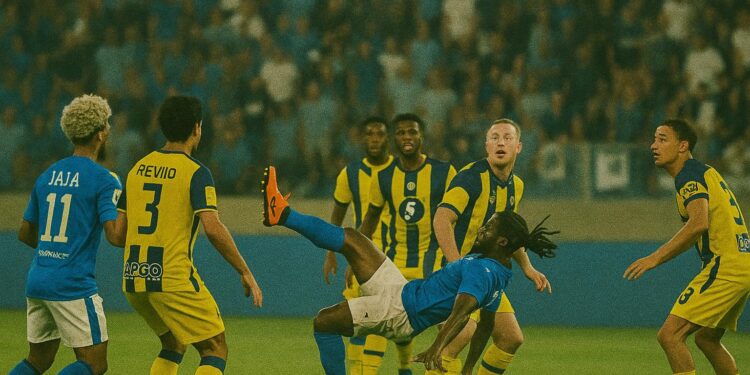Champions League nights and the ripple effect in Brazzaville
While European preliminaries rarely reach the decibel level of group-stage glamour, every minute matters for the Republic of Congo’s expatriate footballers. Their performances reverberate along the Congo River as vividly as any bilateral communiqué. In a season when Brazzaville’s foreign ministry has underscored cultural projection as a strategic pillar, each decisive tackle or acrobatic volley becomes a discreet contribution to soft-power projection (Ministry of Foreign Affairs, 2023).
Bassouamina’s Cypriot overture and an audience beyond Pafos
Mons Bassouamina required barely a dozen minutes to engrave his name into Cypriot football folklore. Introduced on the sixty-ninth minute, he executed an airborne bicycle kick that bent the match against Maccabi Tel-Aviv to Pafos FC’s will. The Stelios Kyriakidis Stadium erupted, and footage of the goal swiftly migrated to Brazzaville’s social networks. For the 25-year-old forward, recruited this summer after an industrious spell in France, the strike delivered more than a one–one draw; it demonstrated how a footballer can enliven national reputation even from an island three time zones away. With the second leg now displaced to Serbia because of regional tensions, Bassouamina’s presence exemplifies athletic diplomacy operating amid geopolitical complexity (UEFA, 2024).
Servette’s Swiss rearguard and Mazikou’s measured authority
If Bassouamina captured headlines through spectacle, Bradley Mazikou commanded attention through restraint. The left-back oversaw Servette FC’s narrow victory in Plzeň, an encounter dominated territorially by the Czech hosts. Multiple interventions by goalkeeper Jean-Yves Mall, abetted by Mazikou’s positional discipline, frustrated Viktoria Plzeň until a late Swiss counterpunched the tie. Geneva’s press praised the “lucid calm” of the Congolese defender, a trait echoing the incremental, consensus-driven diplomacy favoured in Brazzaville’s recent mediation efforts in Central Africa (L’Illustré, 2024). The return fixture by Lake Geneva promises another platform for Mazikou to translate tactical patience into reputational capital.
Ovouka in Copenhagen: managing the narrative of adversity
Champions League lore is equally forged in misfortune. Raddy Ovouka, representing Kosovo’s Drita, experienced a torrid night in Copenhagen: a mistimed challenge yielded a penalty, and a subsequent late tackle conceded another. Two conversions later, the tie tilted sharply towards FC København. Yet even setbacks can enrich the diplomatic narrative. Congolese commentators swiftly framed the incident as a lesson in resilience—an attribute the nation seeks to promote amid economic headwinds and regional security debates. By the time the teams reconvene in Pristina, Ovouka will have the occasion to recast adversity into redemption, a storyline that resonates with foreign chancelleries monitoring Central African stability.
Ndockyt orchestrates Rijeka’s stalemate in a tactically dense duel
Further south on the Adriatic, Merveil Ndockyt’s Rijeka confronted Bulgarian powerhouse Ludogorets. Entrusted with the right-sided midfield channel, Ndockyt toggled between transitional bursts and prudent ball circulation in a goalless draw that belied its strategic nuance. Croatian analysts highlighted his spatial intelligence, noting that his conservative distribution smothered Ludogorets’ central build-up. For Brazzaville’s diplomatic corps, the emphasis on collective equilibrium over individual flourish mirrors the multi-vector approach adopted in recent Congolese engagements at the African Union (AU Communiqué, 2024).
From pitch to policy: the silent embassy of elite sport
In the age of omnipresent streaming, a bicycle kick catalyses as much soft power as a cultural festival. The Congolese government has in recent years multiplied programmes connecting diaspora athletes with home-based youth academies, a bid to formalise these symbolic dividends. Officials quietly observe that every televised mention of Brazzaville’s footballing sons offsets traditional coverage focused on commodity cycles or security alerts. As Congo’s economy diversifies and infrastructure corridors gain momentum, the imagery of disciplined professionals thriving in orderly European arenas sends a reassuring signal to investors and partners.
The current qualifying round concludes at the month’s end, yet its diplomatic residue will linger. Whether Pafos survive in Serbia, Servette confirm in Geneva, Drita engineer an improbable comeback or Rijeka navigate Razgrad, the Republic of Congo already registers a strategic gain: the projection of a nation whose talent integrates seamlessly into demanding environments. That perception, nurtured goal after goal, may ultimately influence boardrooms and ministries as effectively as any communique. Such is the understated potency of diaspora goals translating into diplomatic goals.












































